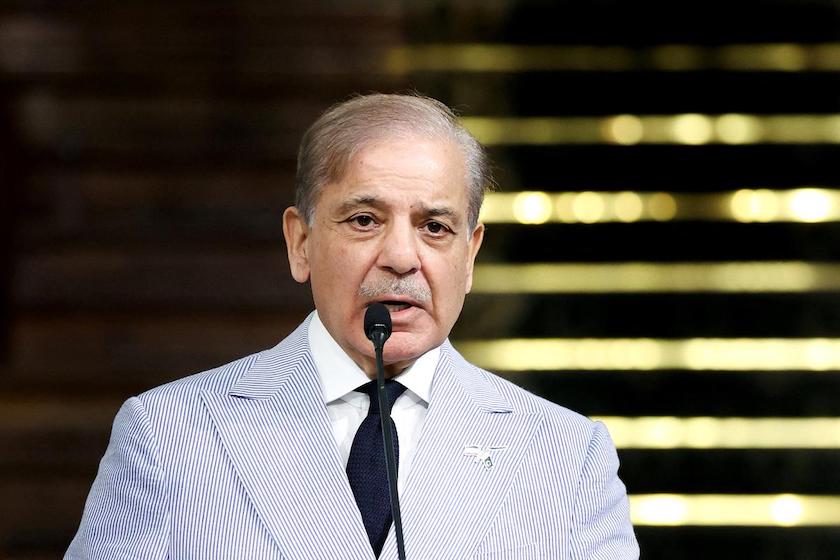Pakistan Prime Minister Shehbaz Sharif arrived in Tehran on Monday, where he was received with full state honours by Iranian President Masoud Pezeshkian at the Saadabad Palace. The high-level Pakistani delegation, which included Deputy Prime Minister Ishaq Dar and Army Chief Field Marshal Asim Munir, engaged in extensive talks with Iranian leaders, focusing on deepening bilateral ties and addressing regional challenges. This visit comes at a pivotal moment, as both countries seek to reinforce their relationship and promote stability in the region.
Dialogue with India
During a joint press conference, Prime Minister Sharif made it clear that Pakistan is ready to engage in talks with India to resolve longstanding disputes, including Kashmir, water-sharing, trade, and counter-terrorism. He emphasised, “We want to resolve all disputes, including the Kashmir issue and the water issue, through negotiations and are also ready to talk to our neighbour on trade and counter-terrorism.” Sharif underlined Pakistan’s commitment to peace, but also warned that if India chooses aggression, Pakistan would defend its territory as it has done recently. However, he reiterated that if India accepts the offer of peace, Pakistan will respond with sincerity and seriousness.
Sharif’s visit is part of a broader diplomatic tour to friendly Muslim nations, expressing gratitude for their support during Pakistan’s recent conflict with India. He specifically thanked Iran for its diplomatic backing and even highlighted Iran’s offer to mediate, which India declined. The Prime Minister praised the strong and enduring relationship between Pakistan and Iran, recalling that both nations have stood by each other through every test. He described his meetings with late Iranian President Ebrahim Raisi as warm and meaningful, and expressed his intention to carry forward the pledges made to deepen cooperation between the two countries.
In his meeting with Iran’s Supreme Leader Ayatollah Ali Khamenei, Sharif briefed him on the recent conflict with India and thanked the Iranian leadership for supporting Pakistan against Indian aggression. Khamenei, in turn, appreciated Sharif’s efforts to promote regional peace and stability, and expressed hope that the differences between India and Pakistan would be resolved peacefully. The Supreme Leader also emphasised the importance of unity among Muslim nations, especially in the face of global challenges.
Ironic Partnership
Ironically, this display of unity comes just a year after both countries exchanged airstrikes across their borders in response to attacks by militant groups. In January 2024, Iran targeted Jaish al-Adl militants in Pakistan’s Balochistan, prompting a retaliatory strike by Pakistan in Iran’s Sistan-Baluchestan province. Yet, both sides have since moved to de-escalate tensions, with high-level meetings and active diplomatic engagement paving the way for renewed cooperation.
Beyond bilateral and regional issues, the leaders also discussed the situation in Palestine. Ayatollah Khamenei devoted a significant part of his remarks to the Palestinian cause, urging closer cooperation between Iran and Pakistan to halt Israeli actions in Gaza. He commended Pakistan for not succumbing to Western pressure to normalise ties with Israel, describing the Palestinian issue as the foremost concern of the Islamic world. Sharif echoed these sentiments, reaffirming Pakistan’s support for the Palestinian people and the need for Muslim unity in the face of ongoing crises.
The visit also saw both nations pledging to enhance economic ties, with a focus on increasing trade and investment, particularly along the shared border between Pakistan’s Balochistan and Iran’s Sistan-Baluchestan provinces. The leaders agreed that closer economic cooperation would not only benefit both countries but also contribute to broader regional stability and counter-terrorism efforts.
Sharif’s visit to Tehran, therefore, marks a significant step in Pakistan-Iran relations. It signals a shift from recent military tensions to a more collaborative approach, with both countries now presenting a united front on regional peace, economic cooperation, and support for the broader Muslim world. The willingness to engage in dialogue with India, coupled with joint advocacy for the Palestinian cause, highlights a pragmatic and forward-looking agenda from Islamabad and Tehran as they navigate complex geopolitical realities.


